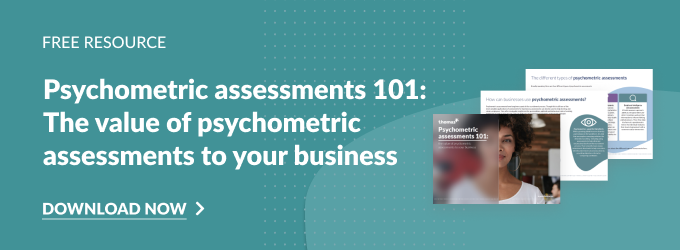Psychometric tests are transforming how recruitment is being conducted throughout organisations. Hiring managers, in particular, are turning to psychometric tools in order to recruit the best possible candidates in a more efficient, consistent and reliable way.
By measuring traits such as aptitude, communication style, and emotional intelligence in a candidate upfront, they can develop a much clearer picture of the candidate, as well as a stronger gauge of their suitability for a specific role or position.
Here at Thomas, we offer a range of psychometric assessments that’ll ensure you hire the right personnel for your company. In this helpful guide, we’ll cover the advantages of psychometric tests in recruitment, of which there are many.
Among some of the top benefits, companies may experience increased job satisfaction, lower staff turnover, and even more robust succession planning. Let’s delve into some of the advantages of psychometrics to explain them in further detail.
What are the key benefits of psychometric tests in recruitment?
As previously mentioned, there are several benefits to using psychometric tools for recruitment purposes. These tests are designed to provide objective and measurable data to help managers make informed decisions for hiring. Psychometric assessments such as a skills assessment test explore aptitude and ability by measuring a candidate’s intelligence levels against others.
In other words, they can help managers delve into how and why a candidate might act a certain way, for instance, during a high-pressure sales call or when working as part of a team. Psychometric testing can assist hiring managers in:
1. Understanding how people will behave at work
Understanding how someone will behave in the workplace is key to hiring. Psychometric tools that focus on behaviour and personality will be able to provide you with data indicating a candidate’s preferred communication styles, their ability to stay calm under pressure and what motivates them as an individual.
2. Identifying leadership potential in job applicants
A key determinant of leadership potential, leadership assessment tests will help you determine whether or not a candidate could be a future leader. In doing so, they can support better succession planning. The insight these kinds of tests offer help to inform 121s where progression is a crucial point of discussion. They can also maximise engagement and ambition levels among employees.
3. Accurately testing general intelligence of candidates
Psychometric assessments explore aptitude and ability by measuring a candidate’s intelligence levels against others. This method of measuring cognitive ability can inform how long it might take a candidate to pick up new skills, how well they’ll deal with words or numbers on the job, and how quickly they might process information, for example.
4. Interpreting candidate emotions and their ability to maintain relationships
By assessing the emotional intelligence of a candidate with psychometric tests during recruitment, you can derive how well they might work with other team members, understand their specific way of communicating with others and predict what kind of manager they might be.

Are there any other advantages of using psychometric assessments in recruitment?
Up until now, we’ve focused mainly on the benefits of psychometric tests as they pertain to employee assessment; however, the organisational gains extend well beyond this. Integration of psychometric assessment with the candidate selection process can result in recruitment efforts that are more time-efficient, cost-effective, consistent and standardised.
As a result, psychometric testing can become an invaluable business asset that not only streamlines recruitment but also ensures a robust selection process, designed to surface only the most suitable candidates. Psychometric assessments help:
1. Bolster face-to-face interviews
Face-to-face interviews – whether structured or unstructured – help to form an initial impression of a candidate. That said, nerves can present a real factor in how someone might come across. For instance, someone could perform terribly in an interview but possess all the skills and characteristics needed for the job. In the same way, a candidate who gives a great interview doesn’t always equal a great employee.
Using psychometric tools alongside interviews means you don’t have to rely on face-to-face performance alone. You’ll have more takeaways and insights to hand, which helps to make decision making a lot easier.
2. Save time across the recruitment process
Psychometric tests offer a great deal of information about a candidate in a short space of time. That makes these tests an invaluable investment for mass recruitment drives, such as graduate assessments when you’ll need to whittle down to a shortlist from a large pool of applicants as quickly as possible.
3. Highlight candidate skills and abilities (rather than just education and experience)
A candidate’s CV or resume may outline their professional achievements and educational background, but it won’t necessarily delve into a detailed skillset review relevant to the role being recruited. This data is invaluable in identifying the right skills or personality traits for the particular vacancy in question.
4. Forge consistency throughout recruitment
Psychometric testing allows you to work with a trustworthy model time and time again, creating uniformity at macro and even micro recruitment levels. It also offers benchmarks and insights you can revisit later down the line to help with the progression and engagement of future employees.
As we’ve explored, there are so many benefits to using psychometric testing for recruitment purposes. Here at Thomas, we offer a wide range of psychometric tools to suit your recruitment needs. We cover all angles of candidate profiling, including assessing everything from behavioural styles to personality traits, helping you hire the right people and create an engaged and motivated workforce.
Get in touch today to find out more about what we can do for your organisation.




